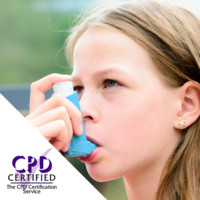Description
This course includes the option to play audio at no extra cost! All about this Administering Medication in Schools Course In our Administering Medication in Schools course you will be introduced to who is responsible for administering medication to pupils. You will consider the legal responsibilities and requirements for the administration of medication in schools, what the medication policy should cover and what procedures should be followed when administering medication. The course will cover some of the most common medical conditions that pupls are likely to need medication for, how these conditions may affect the individual and the types of medication that you may come across. You will also explore the four legal classes of medications: General Sales List medications, Pharmacy medications, Prescription Only medication and Controlled Drugs. You will cover in more detail the five common medical conditions that school staff are most likely to need to support a pupil with including eczema, asthma, diabetes, epilepsy and allergies. You will then look at how medication should be handled in a school setting, including the processes schools should follow and the records that should be kept. You will then move onto looking at parental/carer consent for short and long-term medication, receiving medications, including prescription medications and how to record these, how medications should be stored including requirements for controlled drugs, medication audits and their value, how medications are safely disposed of and what to avoid and Medication Administration Records (MARs) and general advice for all record keeping. Finally, you will explore the importance of preparing to administer medication and the tools to reduce the risk of medication mistakes. You will then look at the different ways medication can be physically administered as well as looking at monitoring pupils after medication has been administered, common side effects they may experience as well as adverse reactions and how to manage these and emergency situations. In order to complete the course, you must achieve 80 or more in the final multiple choice quiz. You will earn 3 CPD points on completion of the course, this course will take around 3 hours to complete and the certificate will last for two years. Fully CPD registered Completed online with instant downloadable certificate Fully printed certificate posted next day Suitable for anyone working in a school environment Complete the online multiple choice assessment as many times as you need to pass Units covered Unit 1 – Introduction to Administering Medications – In the first unit you will be introduced to what administering medications mean. You will explore the legal responsibilities and requirements associated with administering medication and more specifically what the legal requirements are for schools and school staff. The unit will finish by exploring the appropriate and safe procedures for administering medication and why following these procedures is important. Unit 2 – Different conditions that may need medication – In this unit you will be introduced to the type of medical conditions that pupils are likely to need medication or support with. You will look at the types of medications, those that are most common and that pupils are most likely to need support with during the school day. Finally you will look at how medications are categorised and the four legal classes of medications. Unit 3 – Handling of medication – In this unit you will explore how medications should be handled in a school setting, including the processes schools should follow and the records that should be kept. You will finish the unit by looking at the importance of confidentiality and that all records must be kept in line with the principles of the General Data Protection Regulations (2018) and the Data Protection Act (2018). Unit 4 – How to administer medication – In this unit you will look at the processes involved in the administration of medication. You will consider where the key information needed to safely administer medication can found, such as the dosage and instructions for administration. You will finish this unit by looking at monitoring pupils after medication has been administered, common side effects they may experience as well as adverse reactions and how to manage these and emergency situations.






Reviews
There are no reviews yet.